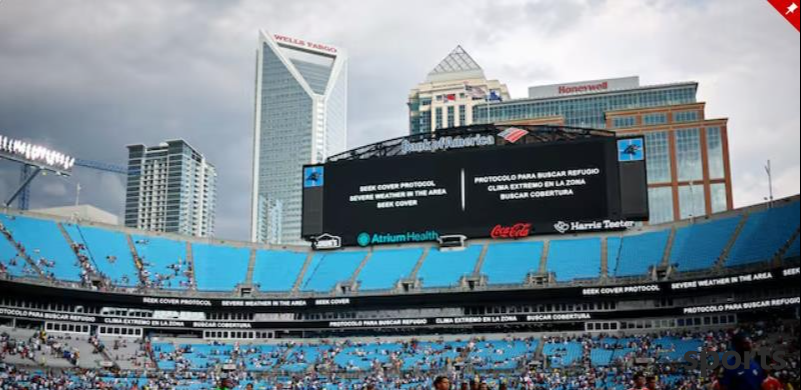QQ-Sports > Football > Is the 2025 Club World Cup a preview of the 2026 World Cup?
Is the 2025 Club World Cup a preview of the 2026 World Cup?
After Chelsea thrilled over Benfica 4-1 and advanced to the semi-finals of the 2025 FIFA Club World Cup, Blues coach Enzo Maresca could not hide his anger. The game, which should have been celebrated for victory, ended in an unprecedented chaos. But what really made the Italian coach furious was not the score itself, but the football nature that was completely distorted by the dual influence of the weather and organizational arrangements in the game.

Originally a seemingly ordinary game turned into a double torture for more than four hours, which lasted for players' physical fitness and psychology. The game kicked off at 4 p.m. in Charlotte, North Carolina, when the sun was suffocating. Rees James scored the first record for Chelsea, and the team once had the advantage, and everything seemed to be under control.
However, the thunderstorm suddenly came and referee Slavko Wincic had to interrupt the game. From that moment on, everyone was trapped in absurd wait for 115 minutes. Maresca summed up all this in two words: "farce".
During this long waiting time, Chelsea players were worried about the safety of their families in the stands, while passing the time: some people found some food, some people were browsing their phones, and the coaching staff were busy letting everyone ride bicycles to maintain muscle heat. No one knows when the game will resume, and every time a lightning flashes across the night sky means another half an hour of waiting. This frequent interruption not only cools down the players' game state, but also cuts off the passion and coherence that football should have brought - and this is the charm of the sport.
As expected, when the game started again, Chelsea was no longer the original Blues. Benfica, the team that originally thought it could be a holiday in advance, suddenly rejuvenated and launched a fierce counterattack. The Blues could no longer maintain their previous rhythm and looked exhausted. In the 90+5th minute, Di Maria scored a controversial penalty and tied the score, and the game was dragged into overtime. Maresca described the scene at this moment as “another game”—because in fact, it was no longer the football he was familiar with.
Of course, Chelsea won in the end, locking in the victory with three goals in overtime by Nkunku, Neto and Desbury Hall. But compared to the victory or defeat itself, the question raised by Maresca is more worthy of deep thought in the entire football world: If every city may postpone the competition due to thunderstorms, then is the United States really suitable for hosting such a large-scale international event?

This is not only a criticism of a game, but also an early warning of the 2026 World Cup. As the first World Cup in history to expand to 48 teams and an unprecedentedly dense schedule, if six games of the club World Cup this summer have been delayed in five different cities due to weather reasons, how can FIFA deal with such a huge challenge next year?
Although the United States has an advanced lightning warning system that can reduce some risks, it cannot stop raining and thundering, and it cannot stop fans around the world from increasingly losing patience. In fact, Maresca is not the only one who thinks this situation is ridiculous. A top event was interrupted for two hours and finally ended at midnight local time - this is a golden viewing period for European audiences for a long time, and it may only bring about the shaking of the broadcasters and sponsors' heads and sighs, and the losses are immeasurable.
In addition, the game attracted only about 25,000 spectators, which was much lower than a third of the capacity of the Bank of America Stadium. This picture clearly reflects two worrying issues: the enthusiasm of American fans is still questionable, while the stability of the event organization is a greater concern.

Perhaps FIFA is attracted by huge gains – for example, Chelsea received about $54 million in this tournament – but the price is a significant decline in the quality of the game and a serious damage to the fans’ experience. Maresca’s questions are not only practical, but also remind FIFA’s global strategy needs to be reexamined.
He said: "This is football, not a game of luck." But obviously, in places that may be interrupted by thunderstorms and then rebooted, football is standing on the edge of its own cliff. Perhaps the most ridiculous thing is not that the game was interrupted for 115 minutes, but that no one dared to question FIFA except the coach who just won the game, which is the most thought-provoking thing.
7m freeRelated Posts
Hernanes: Fortunately Inter Milan beat Roma, I like that kind of offensive football
FootballOctober 19th After Roma lost 0-1 to Inter Milan at home, Hernanes commented on the game after the game. How do you analyze this match between Roma and Inter Milan? The first half looked like two teams of different levels, with Inter Milan in control...
【Football】
moreLatest Serie A points report: The first 3 points are the same, Napoli falls, Inter Milan overthrows Roma
FootballThe 7th round of Serie A consisted of 4 games. Lecce faces Sassuolo at home. The two teams played evenly in this game. Lecce had 11 shots and Sassuolo had 9 shots. As a result, neither side could score and it ended with a score of 0-0. The game betw...
【Football】
moreThe 8th round of the Premier League has ended with 7 games. The latest standings are as follows!
FootballThe latest Premier League standings With Trossard's only goal in the 58th minute of the second half, Arsenal defeated Fulham 1-0 and ushered in three consecutive victories. With 6 wins, 1 draw and 1 loss, Arsenal continues to rank first with 19...
【Football】
more
Hot Posts
- La Liga latest points report: Real Madrid surpassed Barcelona, Girona won the first victory, Biba won 2-1
- Choi Kang-hee s agent showed up, and she left without giving a high salary. The contract renewal was deadlocked
- Pozeko: Coaching Italy is the best moment in life. No one loves my player more than me
- Trezeguet: Juventus is my life. After being relegated, Juventus allowed me to leave but I didn t leave
- In the Ligue 1 League, Lons vs. Brest, Lons is worried at home, does Brest score away?
- Weekly salary is about 300,000 pounds! British media: Manchester City hopes that the club that rents Gralish will fully bear the salary
- Wang Dalei made a fuss over Wei Shihao and was sent off by the Thai referee, which became the turning point of the game!
- Alonso ordered! Real Madrid plans to sign Manchester City s cornerstone with 100 million euros!
- Alonso s iron-blooded wrist! 6 Ultimatum players, genius and meritorious players can sit on the bench, Real Madrid has changed its days
- Rashford is approaching: Manchester United officially starts sales procedures this summer
Recent Posts
-
Ronaldo will ask to buy Bayern winger: The former reliable and lucky player is now going to "super retirement and earn money"
-
ESPN: Juventus and pharmaceutical companies are interested in Sterling, Chelsea priced at 20 million euros
-
Rakitic: Magic Flute is very happy in Milan and he can join. Thanks to Tare, he may lead the team to win the championship
-
It is sad that Setien has long been isolated by the Guoan players. When leaving, the Guoan players were silent and only one substitute player saw him off.
-
Nico said no, but Bayern won t give up
-
Premier League match of 2.1 billion tonight! Arsenal challenged 12 years of curse, Salah scored 3 major records
-
Not leaving? 40-year-old Ronaldo responded publicly! Confirmed not to participate in the Club World Cup: Despite receiving many invitations
-
Mannwan: Manchester City s sale of Savigno has caused pressure to rebuild, director Viana may make a huge price
-
11 against 9 draws! Omoy Juanfer: It s really uncomfortable, it s our three-pointer
-
A 5-2 game! Mourinho stages a Jedi counterattack, Roma advances to the Champions League life and death battle